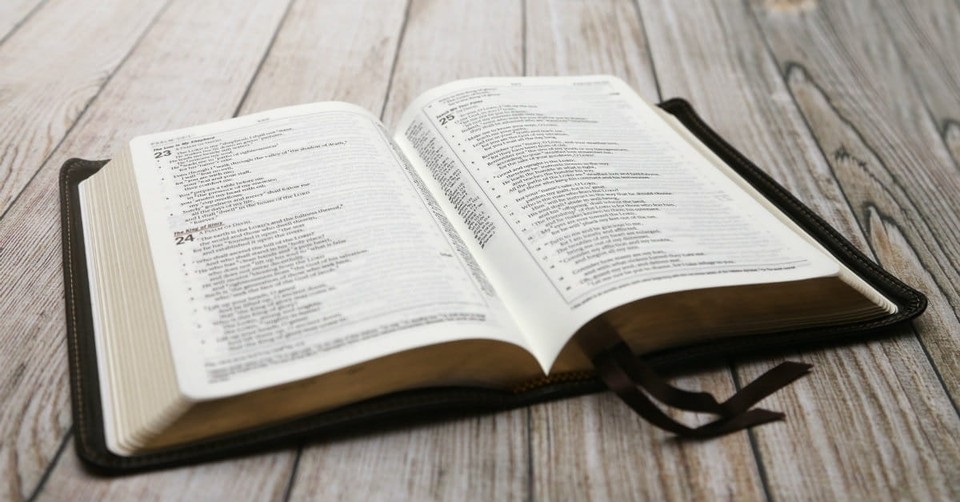3 New Ways to Think about Psalm 23

“The LORD is my shepherd, I shall not want . . .”
Sound familiar?
Psalm 23 is one of the most recognizable chapters in the entire Bible. We learn it in Sunday school, see it in funeral programs, and notice it on church décor. Even those who do not attend church have likely heard this psalm before.
When verses and chapters become familiar, we tend to not pay close attention to them. When we see it in our Bibles, it can be tempting to think, Oh, I know what this says already. Why read it again?
Here’s why—because the Bible is a living document. In 2 Timothy 3:16–17, Paul writes, “All Scripture is breathed out by God and profitable for teaching, for reproof, for correction, and for training in righteousness, that the man of God may be complete, equipped for every good work.”
The Bible never changes, but it always changes something in us when we read it. The Word of God always has something new to teach us, even if it’s from a familiar passage.
Recently, I was reading through Psalms and scanned over chapter 23. I almost skipped it, but decided to read it again. As I did, the familiarity faded, and I felt as though I was reading it with new eyes. Has that ever happened to you? As I read, three questions came to mind. They challenged me. I’m passing them along in the hopes they will challenge you, too.
Question 1: Am I allowing God to lead me?
God is always in control of what is happening, but we also have free will. That means we can choose to let God lead our lives. When we don’t, it’s the same as choosing to be led by our selfish desires. The opening of Psalm 23 beautifully shows what we can gain from surrendering and allowing God to lead our lives.
The LORD is my shepherd; I shall not want. He makes me lie down in green pastures; He leads me beside still waters. He restores my soul. He leads me in paths of righteousness for his name’s sake (vv. 1–3).
As I read this again, I realized that if God is our Shepherd, that means means we give Him control of our life. When we do, look at what there is to gain!
- God will meet our needs.
- He will give us peace.
- He will restore us.
- He will lead us down a path of righteousness and not destruction.
If your world seems chaotic or unfulfilling, ask yourself, “Am I allowing God to lead me?”
Question 2: Am I camping in the valley?
Even though I walk through the valley of the shadow of death, I will fear no evil; for you are with me; your rod and your staff,
they comfort me (v. 4).
I heard a pastor say that this verse clearly states that the “valleys” of life are to be walked through, but some people tend to put up a tent and camp there. Convicting, huh?
Sometimes we get bogged down in our circumstances and just decide that’s the way it will always be. We figuratively pitch our tent in the valley. This tends to rob us of the joy that can come from our relationship with God.
During the valleys of life, you must remember the last two lines of this verse, that God is with you and will comfort you as you walk. Don’t choose to camp out and wallow in your misery. Put one foot in front of another while asking the Lord to provide a way out.
If you are going through a season of sin, discouragement, or despair in your life right now, ask yourself, “Am I walking or camping?”
Question 3: Have I lost sight of God’s faithfulness?
Let’s keep thinking about valleys for a moment. Sometimes in the valleys of life, we take on a “woe is me” attitude and completely ignore all of the blessings that God has given us.
Let’s circle back to Psalm 23.
You prepare a table before me in the presence of my enemies; you anoint my head with oil; my cup overflows. Surely goodness and mercy shall follow me all the days of my life, and I shall dwell in the house of the Lord forever (vv. 5–6).
This means that if you could put your blessings in a cup, they would run over the top. Goodness and mercy will be following you everywhere, and you will spend eternity with God. That’s the ultimate blessing!
Ask yourself, “Have I lost sight of God’s faithfulness?” If you feel like you have, even if you are not going through a hard time, stop and make an actual list of all the ways that God has been faithful to you. You can start in the comment section below. Even on your worst day, you will see God’s blessings overflowing in your life if you look for them.
As an added bonus, you will feel your spirit lift as you write. You literally cannot dwell on bad thoughts and the blessings of God at the same time. Seriously. Try it!
This article originally appeared on Revive Our Hearts and LiesYoungWomenBelieve.com. Used with permission.
Sarah Garrett is a passionate educator and founder of the Transformed4More Ministries that she runs with her identical twin sister. It is her desire to reach struggling teenagers and tell them about the transformative power and love of God.
Image courtesy: ©Thinkstock/pamela_d_mcadams
Publication date: September 22, 2017
Originally published September 22, 2017.





